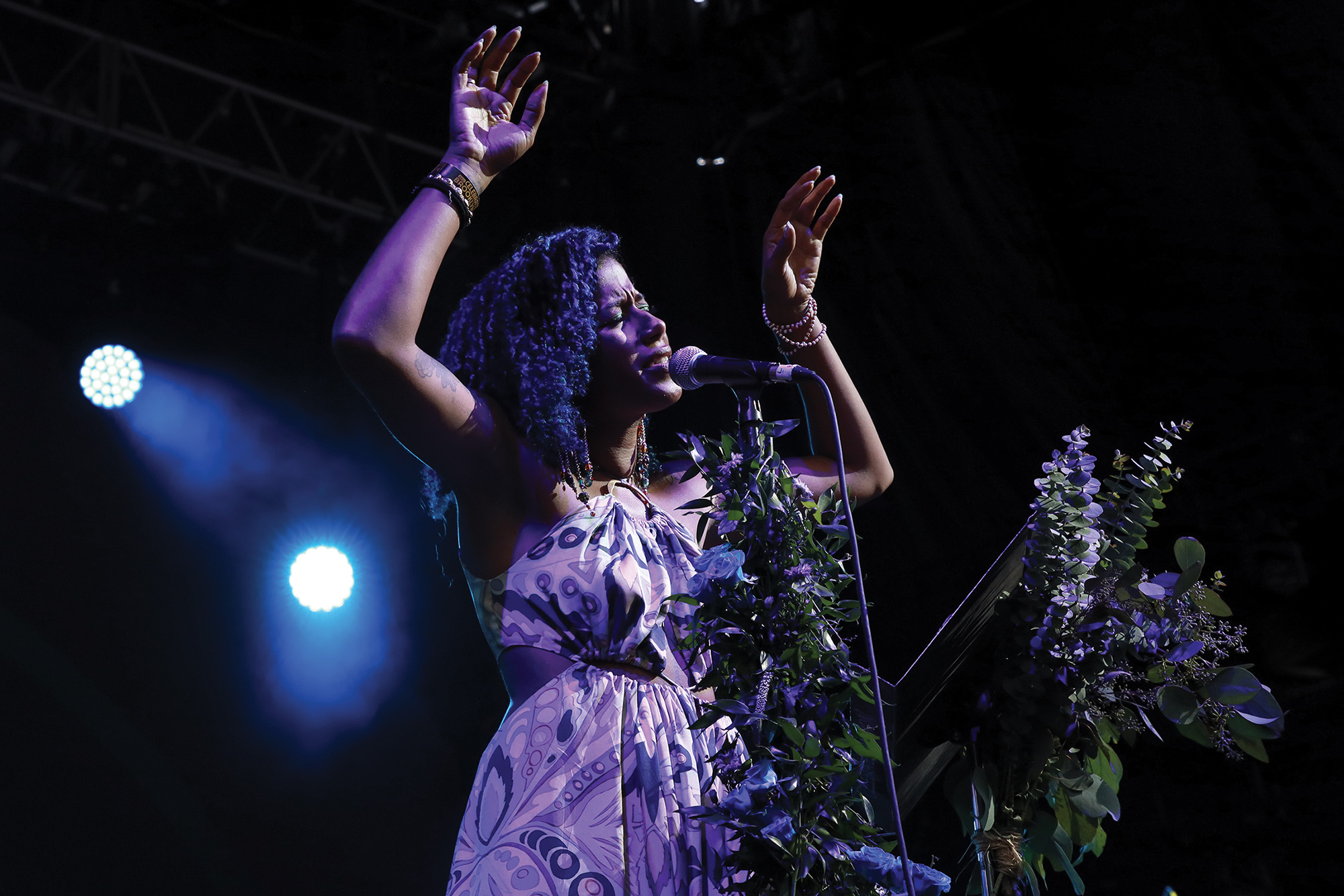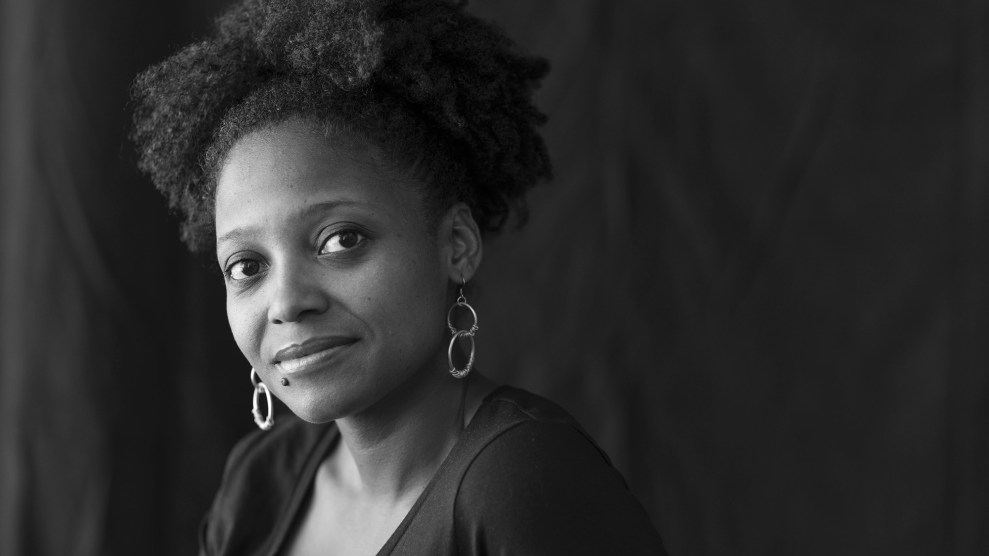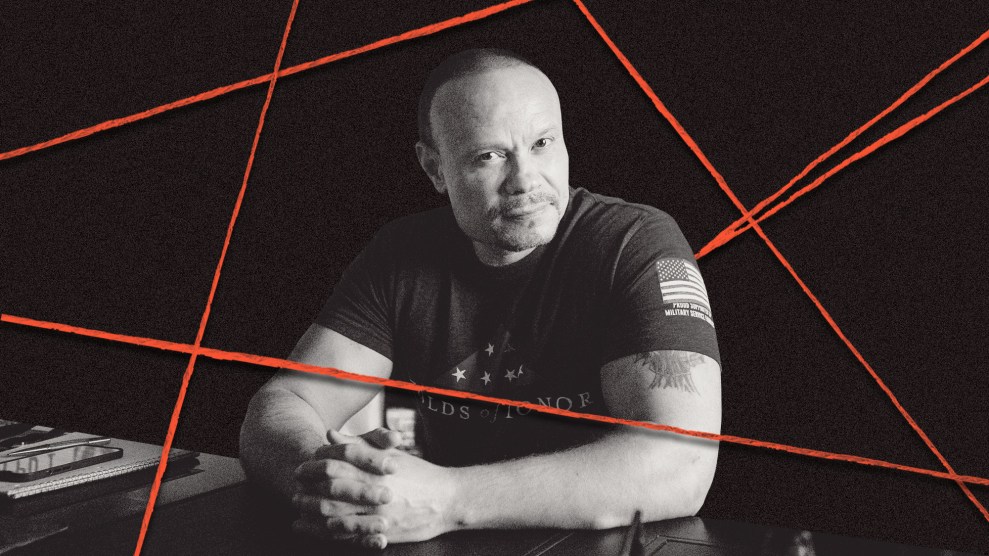On the first brisk night of fall in Los Angeles, the self-described surrealist blues poet aja monet emerges onstage at the El Rey Theatre, an art deco movie house turned concert venue, to rapturous applause. Flanked by a double bassist, a saxophonist, a keyboard player, and a drummer, monet stares out in disbelief at the packed room. “I can’t believe y’all came,” she says to the crowd of roughly 500 people, visibly humbled.
If poets are often characterized as misanthropes toiling in obsessive solitude, monet instead sees her work as inseparable from the collective experience.
Moments later, she kicks off the show with a poem titled “why my love?” which wends its way through a sumptuous jazz groove. About midway through the song, monet begins to cry out “why” on loop, evoking a distinctly different emotion with each repetition, oscillating from care to frustration to elation. With nary a phone outside a pocket, the room of mostly twentysomethings collectively holds its breath. One woman places her hand over her heart and leaves it there. In that moment, monet transforms into a rock star. As her friend and collaborator V (formerly Eve Ensler) describes it, to see monet perform is to be in the presence of someone “channeling something.”
Only a handful of artists can bring together club kids, businessmen, and librarian types, on a chilly Wednesday no less, to stand reverentially as a poet leads a jazz band in electrifying spoken-word numbers. Fewer still can make a concert feel like a genuinely communal affair—a rare sight in a city that, by design, makes chance encounters and spontaneity difficult to come by. But monet, a New York City native who calls LA home, is uniquely situated to meet our divisive moment.
Monet, 37, draws from the lineage of the Black Arts Movement of the 1960s and ’70s, an era when gifted wordsmiths nurtured one another’s ideas, often performing in tandem with musicians. A poet since her teenage years, monet, who prefers lowercase letters because “they feel more feminine…and have less sharp corners,” won the coveted Nuyorican Poets Café Grand Slam title at 19—the youngest person at the time to have ever taken that crown. After racking up accolades like the NAACP’s Image Award for her acclaimed poetry collection My Mother Was a Freedom Fighter in 2018, she went on tour to showcase her Grammy-nominated 2023 album, when the poems do what they do, which features a jazz ensemble and several vocalists.
Like much of monet’s work, the album tackles polarizing systemic issues—environmental racism, exploitative labor practices, income inequality—in granular and galvanizing ways. In scintillating poems like “the devil you know,” these verses also explore the psychic barriers that prevent humans from truly accepting, and doling out, love. “Revolution is not a spectator sport,” she proclaims. “It begins with you loving you enough to love me as i am you.”
Another theme in her performance is technology’s all-consuming nature—and how algorithms help shield people from harsh truths by hiding them under filters, photographic and otherwise. One of the most gripping moments of the El Rey show came when monet urged her audience not to use their phones to hide from real experiences and emotions: “Let us not be too precious to be hurt, to have gone through a thing or two.”
Monet urged her audience not to use their phones to hide from real experiences and emotions: “Let us not be too precious to be hurt, to have gone through a thing or two.”
This tender and present approach is likely why monet has won over Gen Z fans. Logan Richardson, the alto saxophonist who tours in monet’s band, notes that monet wasn’t sure what the turnout might be at their Toronto Longboat Hall show in June 2024, given that she’d never been to the city before. “We looked out the window,” Richardson says, “and the line was all the way down the street.” In the past year, monet and her band performed at larger festivals like the Newport Jazz Festival and Montreal International Jazz Festival, thanks in part to her appearance on NPR’s Tiny Desk Concert series in December 2023. “At times, her words—gentle gut punches to the soul and psyche—had those in the audience whooping in agreement or silently weeping,” an NPR blog post observed.
Sometimes called “a poet of the people,” monet stands out because she counterprograms against the feelings of alienation coursing through our society. Amid a loneliness crisis and the decline of physical third spaces in American life, her work offers a radically different alternative for listeners: communion through grassroots gatherings. (She has dubbed this worldwide tour of her poetry “let’s be offline together.”)
If poets are often characterized as misanthropes toiling in obsessive solitude, monet instead sees her work as inseparable from the collective experience. She is not content just to publish volumes that a niche set of readers consume alone. “Most people think my path in poetry is very untraditional,” she tells me. “I think what was unique for me was that I always saw it as being a part of a community.”
And part of a long tradition. Back during the Black Arts Movement, poets such as Amiri Baraka and Jayne Cortez often performed spoken word pieces alongside inventive musicians and improvisers. (Cortez had her own band, known as the Firespitters.) New York City–based poet Saul Williams, a mentor and friend of monet’s, says that during that era such collaborations became “part of the tradition of Black poets in America,” and poets including Sonia Sanchez, Nikki Giovanni, and the Last Poets were “as revered as popular rappers.”
Born well after the movement’s heyday, in 1987, monet came to find resonance in these artists’ words after she began to interrogate her own history. Hailing from Cuban and Jamaican heritage, she was raised by her single mother in the Brooklyn neighborhood of East New York. Over Ethiopian food in Los Angeles one balmy summer afternoon, I ask monet about her childhood. She replies via a quote that’s long stuck with her: “Coincidence, if traced far back enough, becomes inevitable.” The circumstances of her early life were knotty, she says. She did not wish to elaborate, beyond adding that she went through a litany of events that no person should ever have to experience, causing her to turn within. “That’s what I think developed my strength as a poet,” she says. “How inward I was forced to go because of the things that were outside of my control.”
Monet also threw herself into school, where English class became a balm. “I was very inquisitive about what else was beneath words, and what was beneath what people were saying, and beneath gestures,” she says, biting into a piece of injera. “Language is such a big part of how I have navigated the world, and having to find language for the things that felt unlanguageable.” But save for Langston Hughes, the writers and poets she was introduced to were predominantly white and never fully reverberated. “My heroes were all the people that I was growing up around and speaking to and witnessing,” she says. “So when I saw that they weren’t showing up in the classroom, I was like, ‘Oh, y’all are missing so much about the world.’”
She penned one of her early poems, “Why I Write,” as a teenager. When she read it at a talent show, she felt struck by the audience’s reception. “That was the first time I felt like my teachers looked at me differently and were like, ‘Oh, this kid’s got something,’” she recalls. Monet won the competition. Shortly afterward, she started going to poetry slams and competitions all around the city. She had come home. “I found a whole community in that organization of other young people who are nerdy about poems, like myself,” she says. While monet now rejects the idea of “being scored for your poem,” being exposed to that scene as a young poet was “effective” for her, she says, “if only for the fact that it allowed you to see in real time how people were feeling about what you were saying, and it lets you learn how to read a room.”
She met Williams at Brave New Voices, a youth poetry festival, around 2005. He remembers the then-teenage monet’s work as standing out; she had “an old soul.” Even in the slam poetry era of the late 1990s and early 2000s, when Def Poetry Jam was airing on hbo, monet seemed to understand the poetic traditions of earlier decades. “I always heard Sonia Sanchez’s voice in her voice. And June Jordan’s voice in her voice,” Williams says.

Monet started attending weekly salons at the home of Abiodun Oyewole, part of the Last Poets, a collective of poets and musicians whose rhymes were pivotal to how hip-hop evolved. She kept traveling, performing, competing, each time probing the way language could more precisely reflect the “real stuff” going on around her. One of her early poems, for instance, concerned a young man she’d heard about on the news who’d taken his own life.
But words were only part of her mission; in keeping with the slam poetry tradition she came up in, monet sees her poetry and her community organizing work as entwined forces. After stints in Chicago for graduate school and then Paris, in 2015, she moved to Miami and co-founded Smoke Signals Studio, a convening where people could gather, jam, record, plan events, and share music and ideas—an initiative inspired by the salons she attended at Oyewole’s house back in New York. Members of the community would come over to watch A Tribe Called Quest perform on Saturday Night Live or partake in a poetry open mic.
Over the years, comedian Hannibal Buress, author Mahogany L. Browne, musicians Talib Kweli and Yasiin Bey, poet Sanchez, and other cultural luminaries stopped by. Smoke Signals provided resources, such as guides for people to know their rights should ice come to their doorstep unannounced. She also began working with the nonprofit prison abolition group Dream Defenders, which soon led to a 2015 trip to Palestine that “politicized me in a way that there was no going back the same,” as she told the Los Angeles Times’ Image magazine. “I wasn’t going to just go back to trying to be a poet and publish some books.”
She continued her organizing work and kept nurturing relationships with other artists. “Working with [monet], I’ve reintegrated, in a refreshed way, the importance of people in community and grassroots—actual grassroots—efforts,” Richardson, the alto saxophonist, says. “That is, for me, really the essence of the history of any art that has meaning: the people surrounding that thing and the culture that pushes that.”
After her 1996 play, The Vagina Monologues, became a phenomenon, V launched V-Day, an activist organization dedicated to ending violence against women and girls, which regularly puts on the show. When V decided it was time to pass the torch in 2020, she asked monet, whom she’d met a few years back, if she would put together a new kind of performance. Monet set about sourcing nearly 900 submissions from Black women around the world for the eventual audio play titled voices: a sacred sisterscape. V was floored by how monet reimagined the play. “She’s an amazing combination of this visionary, refuse to play by the rules, refuse to do what everyone expects you to do,” she says of monet. “And she’s one of the best organizers I’ve ever met.”
“She’s an amazing combination of this visionary, refuse to play by the rules, refuse to do what everyone expects you to do.”
Monet’s organizing work in Miami and the simultaneous healing and destructive qualities of water compose the backbone of her forthcoming poetry collection, Florida Water, which will hit shelves in June. When we meet this past summer, monet is agonizing over last-minute edits to the collection while facing another kind of challenging terrain: the dissolution of her former relationship. “The book is going to be far more personal,” she says.
For monet, insulating oneself from the painful realities of life, heartbreak and otherwise, is no way to live. “Hurt was here before we were,” she writes in “unhurt”; “someone you love will eventually disappoint you / maybe even break your heart or hurt your feelings / this will happen / accept it.” This ethos has helped her accept some of her childhood experiences, and it informs how she moves through the world. “We have to implement the sort of structures and support systems in our communities”—like art spaces, she later adds—“that allow us to see our struggles not necessarily as limitations, but as invitations for improvisation, creativity, and inspiration.” As she writes in her poem “castaway,” “the wound teaches us to remember where tomorrow glows.”
Black artists have been doing this for centuries, she notes. “Because of the hardships and the things that we’ve had to overcome, we’ve had to discover and create new pathways that were not there. And that innovation has allowed us to survive, to thrive, and to develop.”
That resilience is more essential than ever. Since the beginning of the pandemic, she says it has become especially difficult for young poets to find a foothold. Organizations like Brave New Voices, the youth poetry festival that monet continues to work with, are, in her view, “not at the scale at which it was when I was growing up, and they’re struggling with numbers post-Covid,” she says. Boosting participation in these international poetry slams, and amassing the funds necessary to do so, faces an uphill challenge in today’s political climate.
Arts organizations around the United States are bracing for potential animosity and budget cuts that a second Trump administration might bring: During his first term, President Donald Trump tried to axe federal arts funding (to no avail). The Heritage Foundation, the architects behind Project 2025, widely thought to be a policy blueprint for Trump’s second administration, has advocated that both the National Endowment for the Arts and the National Endowment for the Humanities be “eliminated.”
Young adults have consistently become lonelier over the past 40 years.
Simultaneously, monet has noticed that the young people she often works with feel “extremely lonely, extremely isolated” because of a confluence of factors, not limited to spending more time indoors alone, mental health struggles, and anxiety about the state of the world. Research has shown that younger people are more likely to feel a sense of loneliness compared with their older counterparts right now. According to a review of hundreds of studies, young adults have consistently become lonelier over the past 40 years. A study by Harvard’s Graduate School of Education found that lonely people say they lacked community and meaningful group activities.
Monet’s shows gently invite audience members to participate in a sense of collective connection, whether by galvanizing them to volunteer in their neighborhoods or simply absorb the words and sounds in the room. “It was so sweet to taste the joy of the moment in between the tears of the movement,” a fan who’d attended her LA performance commented on monet’s Instagram feed.
When the poet and her band eventually take their final bow on the fake flower–festooned stage at that show at El Rey, the room feels different, as though the audience had exhaled a collective, contented sigh. By virtue of contemplating and reveling in thoughtful art in a room with others, hundreds of people spill out onto the street, each of them turning over different ideas and ways of being—emerging, perhaps, a little transformed.
















